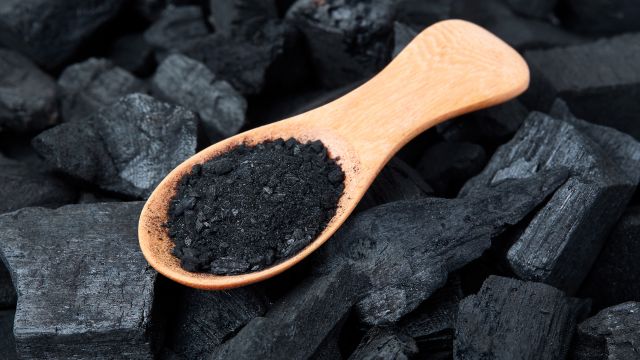Wellness brands and social media influencers alike have embraced activated charcoal as the hottest new health craze. Labels boast that activated charcoal can relieve bloating, clear skin, cure hangovers, fix bad breath, provide mental clarity and more.
We spoke with Tony Wanna, MD, an emergency room (ER) doctor from Presbyterian/St. Luke’s Medical Center in Denver, Colorado, to learn if these claims are supported by science, and whether you should try activated charcoal yourself.
What is activated charcoal?
Activated charcoal (AC) is a powder that’s made by heating organic materials like coconut shells, wood or coal. Its particles are porous, which makes them super absorbent, especially when it comes to certain toxins.
“Once thought of as a possible ‘universal antidote,’ AC attracts and adsorbs toxic substances,” says Dr. Wanna. “For example, if given quickly enough after an acute ingestion, AC can cling to said toxin while in the gut so you can expel it.” Those substances don’t get absorbed into the person’s body, but rather pass out of the digestive system during bowel movements.
How activated charcoal’s meant to be used
When researchers study AC, it’s usually in regards to its two intended uses:
Suspension form (powder mixed with liquid): AC is used in this form to treat some types of overdoses and poisonings, usually under close doctor supervision.
“The doses given in the ER are on the order of grams,” says Wanna. “When people take it at home, hopefully they’re at least administering it on the order of milligrams.” In fact, emergency doses typically start around 25 grams, so read labels—commercial products shouldn’t contain anywhere near that amount.
Even when professionals administer AC, it doesn’t always get the job done. For example, if it’s given more than an hour after an overdose, it may not be able to bind with the drug before it’s absorbed into the bloodstream.
Controlled clinical data has failed to show that AC administration leads to better patient outcomes as well, Wanna adds, such as time spent in the hospital, need for intensive care or death rates. (There have been human volunteer studies with mixed results.)
Pill form: AC capsules may be used to treat gas on a short-term basis; it may reduce symptoms such as bloating and flatulence after gas-forming meals. But studies are mixed on whether this form of AC works too.
Juice cleanses and hangover cures
AC is often touted as a hangover cure, but it doesn’t bind well to alcohol. Even if it did, hangover cures are typically taken the next morning, hours after alcohol has already reached the bloodstream.
Not only that, but it can cause electrolyte imbalances related to the possible side effects of vomiting or diarrhea. With a hangover, your electrolytes may already be out of range.
As for cleanses, AC will bind to at least some of the juice in your drink mix while it’s still in the bottle. That means it’ll have less capacity to absorb toxins when it’s in your digestive system. Plus, when is does reach your system, it won’t be able to tell the difference between good and bad stuff. Your cleanse may wind up depriving you of essential nutrients.
Okay, but is drinking charcoal bad for you?
A healthy adult may be able to drink AC and feel completely fine, and plenty of people report feeling better afterwards. Some social media influencers claim it’s the reason for their glowing skin or trim waistline, for example. Are those benefits really due to AC? There’s just not reliable scientific evidence to prove it.
Some people should avoid AC, like those who take lifesaving medications every day. It can block the absorption of heart and pain meds, antidepressants and others. Even if your HCP says it’s safe for you to take AC, don’t use it within two hours of taking your other meds.
AC may also cause side effects such as:
- Nausea, vomiting
- Abdominal pain
- Diarrhea or constipation
- Uncomfortable feelings of fullness
- Bowel blockages (rare)
Charcoal in skin and beauty products
“The only reason I can think of to put charcoal on your face is the assumption that it will adsorb toxins, which can then be washed away,” says Wanna. “But what toxins are routinely on people’s faces that cannot be washed off with soap and water? AC is abrasive. I’d be wary of using anything of that nature on my skin.”
The same reasoning holds true for your teeth, he explains. AC may whiten your teeth, but due to its abrasive nature, it might also hurt your enamel in the long run.
The bottom line: “I'm not sure there are many reasons to use activated charcoal at home, and I would definitely recommend asking your doctor before doing so,” says Wanna.
Medically reviewed in July 2018.






